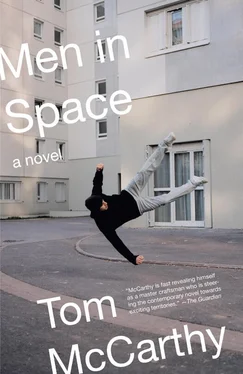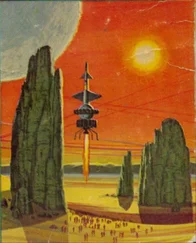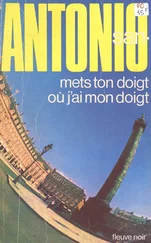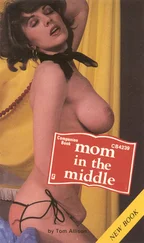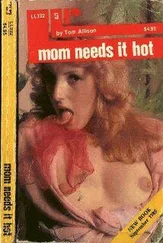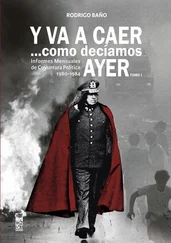“ Providence! ” he shouted to her.
“ What? ” The noise was deafening.
“ Providence! Fate! ”
“ Coincidence! ” she shouted back. She took him to another art show that same afternoon, one in her dad’s gallery, the Prague House of Photography. Gábina took Nick to lots of shows that summer, introducing him to everyone as an art critic. Nick’s only twenty-two, and he’s with Art in Europe! she’d say. Not quite yet, he tried to tell them — but the label stuck, and he was asked to write the odd piece here and there reviewing such and such a show. He found the Czechs really like it if you call something postmodern , so he called everything he wrote about postmodern: These postmodern landscape paintings … This postmodern portraitist … In early autumn, Gábina landed him the job he’s about to clock back onto right now, Dana having lumbered in and clapped her hands, all stern and Rosa Klebs-like …
Nick trudges with the students into Kolář’s studio and takes his jacket off. A blow-heater’s humming at the base of a small podium. Easels and chairs are shuffled into position; Stanley knives zip through large rolls of paper; tape is peeled and cut. Jirka’s already drawing a grid across his paper, lining his space up, netting it. The tiling makes a grid across the floor. Nick pictures again the cross-wires in the skylight above his bed, the pigeons spread across coordinate points behind it. He pictures cages, box junctions and the starter grids of racing tracks as he removes the rest of his clothes, steps naked onto the podium and, bathed by the blow-heater’s stream of hot air, strikes up his usual posture: left leg slightly forwards, slightly bent, both hands on hips.
* * * * *
Yes, Ivan … yes, I’m … Klárá, writhing, hands pushing back leaves, grabbing at them, snapping them and grinding them together as her hips shudder upwards … the one bare thigh where the tights have come half off all pink and goose-pimpled from cold and from excitement … then her whole torso arching like a gymnast’s, rising to a final jolt as the palms open to release a trickle of brown flakes, all skein and membrane run together, flowing back from her towards the ground as yes I’m coming now, don’t … This is Ivan Maňásek’s abiding memory of the revolution.
There are others, of course. He remembers seeing the FILMU students spilling out from their faculty building above the Café Slavia and climbing stepladders, megaphones in hand, to direct people up Národní Třída. He remembers taxi drivers, wirelesses tuned constantly to Radio Stalin, refusing to take payment as they ferried him first to Havel’s apartment on Rašínovo Nábreží, and then — clasping the statement the O.F. movement had entrusted to him to deliver to the Soviet Embassy — to his mother’s so that she could check the Russian grammar in it … and finally, clasping the alarm clock he’d swiped from her kitchen (Havel had insisted the statement arrive at the same time, to the minute, as the one Eliška Šumová was carrying to the Americans), edging through the crowd of people holding candles as they flowed around the car towards the Lennon Wall, on up to Hradčany. He remembers being arrested the moment he left the embassy and held for two days before — without explanation — being suddenly released to find the crowds were everywhere, filling all of Letná with their banners as he made his way down to Václavské Náměstí, where Havel — now president in all but name — was installed on a balcony, his speeches drowned out by cheers and jingling keys, the whole square a mass of flags, bandannas, people dancing, crying, hugging one another, waiters running out of bars and restaurants to hand out cakes, sausages, hot wine …
But his strongest memory comes from just after all this. In the square, Milan Hájek pressed some mushrooms into his hand before disappearing back into the crowd; a few moments later he bumped into Klárá, and they rode up to the park at Šárka, eating Hájek’s mushrooms in the taxi. They came on strong and fast. As the two of them sat in the woods, in silence, facing one another a metre or so apart, the middle finger of Ivan’s right hand slightly twitched, as though coming into unexpected contact with some object. There was nothing solid there, but when Ivan pressed the finger gently forwards he felt an almost tangible pocket of energy forming around it, velveteen and warm. The shape and texture were unmistakable: these were labia. He slid his finger a little further in and felt a clitoris, which he started to stroke rhythmically. Almost instantly — and this was really weird — Klárá started moaning, rubbing her hands over her thighs and slipping her tights down. Ivan undid his belt and moved towards her — but she stopped him, told him that it was precisely his not touching her that was getting her off, and to please just carry right on stroking this displaced, disembodied pussy. In his state, it made sense to play along; he found not only that Klárá’s body would respond to the variation in his strokes despite the fact that her eyes were closed, opening only in brief snatches to look straight up at the sky, but also that her pleasure was infecting him. It was as though an invisible third person, some nymph drawn halfway into existence by the day’s events, were transferring energy between them. Their orgasms, like Havel’s statements, arrived simultaneously. His was without doubt the best of his whole life. It was the best feeling of his whole life. Even before his spasms had died down, he knew that that was what he had been fighting for all this time: not civic participation, freedom of expression or the right to make bad abstract films and paintings, but this feeling, this moment, this limitless and overwhelming potency.
To feel that way again, relive that instant … If what happened in the woods at Šárka was some cosmic, transcendental coitus, then the three years since November eighty-nine have been one drawn-out detumescence. Nothing’s exciting any more. Half the old underground set who he’d get drunk and stoned with week in and week out at Havel’s place were given government positions — not him. Havel won’t have Ivan near him any more. He wondered for a year or so why that might be, then heard from Sláva Kinček — who’s now ditched art to work in advertising (all new Converse All-Star T-shirts, Kickers, reservations at this French place behind Hellichova, they do lobster there Ivan … ) — that there’d been hints from certain quarters that Havel had been let’s say surprised at Ivan’s willingness to take the statement to the Soviets — which, coupled with the fact that his mother was Russian … No one’s been accused of anything outright, you understand Ivan, but there are murmurs … He sank into a deep depression after learning this, one for which alcohol and narcotics have turned out to be his primary, if ineffective, treatment.
This long, long night has been a passage through the first cure in search of the second. He started in the Staropramenná at six or so yesterday evening, then swung by the studios on Lodecká where Radio Stalin had moved when it went overground and became Radio Jedná, dropping off some records Jan Vasek had lent him. Jan was on air — he and Ivan shared a bottle of Moravská between song-breaks before heading next door to Café Bunkr, where they drank some kind of fake champagne. Milan Hájek was in there, holding court at a raised table in the corner; Ivan went and sat beside him, asked him if he was carrying anything. Hájek said no, but he’d be picking up some speed later that night, and to meet him in Újezd at 2 a.m. Ivan and Jan went to see a band called The Martyrdom of Saint Sebastian play in Futurum, where they stayed till one, one-thirty. Then they headed back across the river to meet Hájek, who stood them up — but sent a message, via a student named Karel, that he’d be in the Denní Bar on Karlovo Náměstí at three, with drugs. They turned up there at three-fifteen, with an old black queen named Tyrone from San Francisco who they’d met in Újezd, apparently a theatre director who, it turned out, Jan had interviewed on the radio this afternoon — or was it yesterday by now? It must be almost four …
Читать дальше
